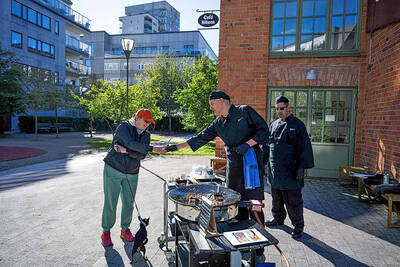Singapore will ease restrictions in a 10-year-old law that bans films promoting a political party or agenda, a report said Saturday.
The Straits Times quoted Lee Boon Yang, Minister for Information, Communications and the Arts, as saying his ministry would table a bill in parliament to amend the Films Act early next year.
His statement followed an announcement by Singaporean Prime Minister Lee Hsien Loong (李顯龍) that the city-state was planning to ease its ban on political videos and outdoor protests as part of a gradual liberalization of society.
“The government accepts that our policies must evolve to remain relevant in the current media landscape. It is no longer realistic to disallow all forms of party political films,” the information minister said.
The government may allow films that are factual documentaries or recordings of live events that were “held in accordance with the law,” the newspaper quoted Lee Boon Yang, who is in charge of Information, Communications and Arts, as saying in an e-mail.
“However, political commercials and films that are dramatized and made to distort issues or create a slanted impression should not be allowed,” the minister said.
The Southeast Asian city-state, which has been ruled by the People’s Action Party for more than 40 years, bans the production and screening of all political films, imposing a maximum fine of S$100,000 (US$73,000) or a two-year jail term on offenders.
The ban came into effect in 1998, two years after the opposition Singapore Democratic Party applied for a license to sell a videotape about the party.
Public gatherings of more than four people without permits are also banned, making it difficult for opposition politicians to reach out to voters.
Martyn See, a Singaporean film maker who had two films banned by authorities because of their political content, welcomed the news although he noted it was unclear to what extent the government would relax its controls.
“My reaction is to re-submit my two banned films for reappraisal to test whether the PM’s pronouncements are for real,” See said.
“There’s lots of skepticism and a wait-and-see attitude judging from the blogs,” he said.

READINESS: According to a survey of 2,000 people, 86 percent of Swedes believe the country is worth defending in the event of a military attack Swedes are stocking up on food items in case of war, as more conflict in Europe no longer feels like a distant possibility, and authorities encourage measures to boost readiness. At a civil preparedness fair in southwest Stockholm, 71-year-old Sirkka Petrykowska said that she is taking the prospect of hostilities seriously and preparing as much as she can. “I have bought a camping stove. I have taken a course on preservation in an old-fashioned way, where you can preserve vegetables, meat and fruit that lasts for 30 years without a refrigerator,” Petrykowska said. “I’ve set aside blankets for warmth, I

FRUSTRATIONS: One in seven youths in China and Indonesia are unemployed, and many in the region are stuck in low-productivity jobs, the World Bank said Young people across Asia are struggling to find good jobs, with many stuck in low-productivity work that the World Bank said could strain social stability as frustrations fuel a global wave of youth-led protests. The bank highlighted a persistent gap between younger and more experienced workers across several Asian economies in a regional economic update released yesterday, noting that one in seven young people in China and Indonesia are unemployed. The share of people now vulnerable to falling into poverty is now larger than the middle class in most countries, it said. “The employment rate is generally high, but the young struggle to

ENERGY SHIFT: A report by Ember suggests it is possible for the world to wean off polluting sources of power, such as coal and gas, even as demand for electricity surges Worldwide solar and wind power generation has outpaced electricity demand this year, and for the first time on record, renewable energies combined generated more power than coal, a new analysis said. Global solar generation grew by a record 31 percent in the first half of the year, while wind generation grew 7.7 percent, according to the report by the energy think tank Ember, which was released after midnight yesterday. Solar and wind generation combined grew by more than 400 terawatt hours, which was more than the increase in overall global demand during the same period, it said. The findings suggest it is

‘ARMED CONFLICT’: At least 21 people have died in such US attacks, while experts say the summary killings are illegal even if they target confirmed narcotics traffickers US forces on Friday carried out a strike on an alleged drug-smuggling boat off the coast of Venezuela, killing four people, US Secretary of Defense Pete Hegseth said. The latest strike, which Hegseth announced in a post on X, brings the number of such US attacks to at least four, leaving at least 21 people dead. An accompanying video shared by Hegseth showed a boat speeding across the waves before being engulfed in smoke and flames. “Four male narco-terrorists aboard the vessel were killed,” the Pentagon chief wrote. He said the strike “was conducted in international waters just off the